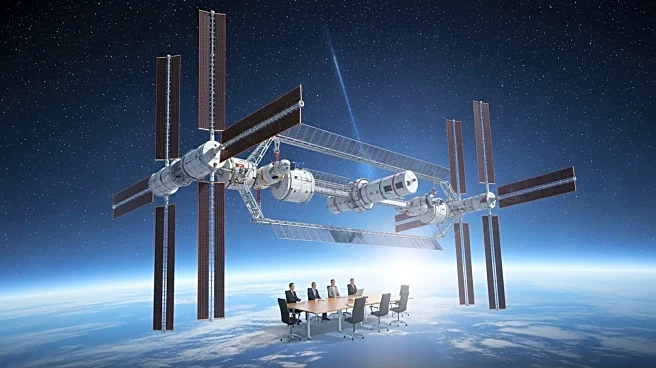What's Happening?
The International Space Station (ISS) is set to be deorbited in 2030, marking the end of a significant era in space exploration. Since its first crewed mission in 2000, the ISS has served as a hub for
international cooperation in space, hosting astronauts from various countries and facilitating over 4,000 scientific experiments. The station's deorbiting will not only result in the loss of its physical infrastructure but also the collaborative spirit it fostered among nations, even amidst geopolitical tensions. The ISS has been a platform for scientific research, including studies on cancer and dark matter, although its achievements have been seen as incremental rather than groundbreaking. As the ISS's operational period concludes, NASA plans to transition to commercial space stations developed by companies like Axiom Space and Blue Origin, raising concerns about the future of open scientific collaboration and data sharing.
Why It's Important?
The deorbiting of the ISS represents a pivotal moment in space exploration, as it has been a symbol of international cooperation and scientific advancement. The transition to commercial space stations could alter the landscape of space research, potentially limiting access to data and changing the dynamics of international partnerships. The ISS has been instrumental in developing the infrastructure and processes necessary for conducting science in space, knowledge that will be crucial for future exploration missions. However, the shift to privately operated stations may prioritize profit over scientific merit, affecting the type of research conducted. The legacy of the ISS in fostering global collaboration and advancing scientific knowledge will be a benchmark for future endeavors in space.
What's Next?
As the ISS approaches its deorbiting date, NASA and private companies are working on developing new space stations to fill the gap. These commercial platforms are expected to host astronauts from various countries, although the nature of international collaboration may differ from the ISS model. The transition raises questions about the governance of scientific research and data sharing, as private companies may not adhere to the same standards as publicly funded institutions. The future of space exploration will depend on how these new stations integrate the expertise and values of the ISS while navigating the challenges of commercialization.
Beyond the Headlines
The end of the ISS era could lead to a reevaluation of how space exploration is conducted, with potential shifts in ethical and cultural dimensions. The commercialization of space stations may impact transparency and accessibility of scientific data, affecting global scientific communities. The legacy of the ISS in promoting peace and cooperation among nations will be a critical consideration as new platforms emerge, influencing the direction of international space policy and collaboration.











